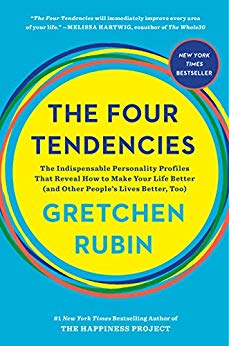

This article is an excerpt from the Shortform summary of "The Four Tendencies" by Gretchen Rubin. Shortform has the world's best summaries of books you should be reading.
Like this article? Sign up for a free trial here .
What is the Rebel tendency from Gretchen Rubin’s Four Tendencies like? How do they behave, and what’s the Rebel Personality?
Out of the four tendencies, the Rebel tendency makes up the smallest percentage of people. Rebels are known for only doing what they want to do, and for refusing to do something if there is any kind of expectation put on the task—even if it’s their own.
Keep reading about the Rebel tendency from The Four Tendencies.
Overview of the Rebel Tendency
Rebels are the smallest tendency, with the fewest members. Rebels resist all expectations, internal and external—they do what they want to do. Another way to think of this is the Rebel “motto” that Rubin gives: “It’s so hard when I have to, and so easy when I want to.”
They value choice, freedom, and self-expression or identity, and enjoy bucking convention and expectation. Sometimes this resistance to expectations gets them in trouble though, and they make a choice that goes against their own self-interest or desires.
| Shortform Example A Rebel might want to be a writer, so she starts writing, no problem. But then her friends tell her they love her work and they’re sure she’ll go places. “Have you got an agent yet?” “When are you going to publish?” Suddenly there are expectations—more than just her wanting to be a writer, people expect her to do certain things or accomplish certain things. Best case scenario, she’ll keep writing but resist following all the conventional expectations such as getting an agent, or seeking to publish. Worst case scenario for a Rebel, the external validation and expectations will interfere with her ability to write, and suddenly she’ll find herself incapable of doing something she wants to do simply because other people have expectations, and now she does too. A simpler example: if a Rebel wakes up and feels like doing his laundry, he’ll do it. If a Rebel wakes up and feels like doing his laundry, but then his wife asks him to do the laundry, he probably won’t. If a Rebel tries to keep a to-do list and wakes up that day to “Do the laundry” written on the list, he probably won’t. In the first scenario, it was a whim, an off-the-cuff want. In the last 2 scenarios, there are expectations, either external in the form of his wife asking, or internal in the form of his own to-do list. |
Strengths of Rebels
Because they do what they want, Rebels are free from the pressures other tendencies succumb to in terms of expectations. They enjoy challenges if they can choose how to meet them, and do best when there are no expectations.
People with the Rebel tendency revel in defying expectations: tell a Rebel she’ll never do something, and she’ll work hard to do that very thing to defy your expectation; tell a Rebel she’d be great at something and she should do it, she’ll deliberately avoid doing that thing to avoid fulfilling your expectation.
If it’s something they want to do, they work hard. Rebels with a cause can be incredibly useful—they serve as the voice of dissent and an alternative to the status quo. According to Gretchen Rubin, Rebels teach everyone else that we’re “freer than we think”: we can do what we want to, and the world will still turn.
Because of their natural tendency to buck convention and expectations, people with the Rebel tendency can actually be very good at resisting harmful socially accepted habits, like smoking, drinking, and so on. And some Rebels are actually drawn to and thrive in highly regulated careers or environments, such as the military, the police force, the clergy, and so on—either because they’ve realized too much freedom isn’t good for them, or because they like having so many rules to break and conventions to resist.
Careers that allow for individuality and value pushing the envelope can be a good fit for Rebels. For instance, academia is full of Rebels, particularly with tenure. Once they get tenure, Rebels have a secure job but one where they can, for the most part, do things their own way, on their own schedule, and still publish papers or make work that rebels against the existing research and carves a new path.
Some other positive ways to describe Rebels:
- Independent
- Think outside the box
- Buck social conventions, or march to the beat of their own drum
- Spontaneous
- Authentic, especially in regards to their desires
Weaknesses of Rebels
Rebels are the most frustrating group to other people. People with the Rebel tendency are perhaps the tendency that other people want to change the most—they expect Rebels to “grow out of it,” “grow up,” or mature beyond their Rebel nature. But that’s just what it is—their nature—and it isn’t a phase they’ll grow out of, it’s the tendency they’ll have to learn to live with (and so will everyone else).
- This might make it seem like Rebels will live their lives alone because they frustrate everyone with their tendency, but never fear, Rebels: Rebels are just as likely as any other pairing to end up in partnerships and romantic relationships.
They resist doing anything they’re asked to do: if someone else has an expectation, they reject it. They resist anything that seems like an attempt to control their actions. The harder you push a Rebel, the harder they push back.
People with the Rebel tendency want to do things on their own time, and frequently cause delays for other people. They also end up taking advantage of others: they know that if they don’t do it, someone else usually will.
But they frustrate themselves as well: Rebels are also second most likely to wish they had a different tendency. Demanding to be free is its own form of control. For example, Rebels refuse to let peer pressure sway their decisions—but responding to peer pressure by doing the opposite is still allowing peer pressure to influence their actions.
People with the Rebel tendency don’t like schedules or calendars, and if something’s explicitly planned, they’ll often cancel. They avoid repetitive tasks unless there are serious consequences for not doing them. For example, a lot of Rebels use automatic bill pay and, if they can afford it, services that do routine tasks.
According to Gretchen Rubin, Rebels refuse labels, even accurate ones, and many find themselves changing jobs often to avoid being trapped in an identity. They’ll even contradict themselves to avoid feeling pigeonholed.
They don’t like systems where someone else decides what they do. Rubin found that many Rebels had only applied for one college—they didn’t like the idea of multiple college admission boards deciding where they could and couldn’t go to school.
Even though Rebels are so averse to having others’ expectations or wills imposed on them, many Rebels will still impose their own will on others. For example, one Rebel wrote about herself: “I want other people to do what I want, just like I want me to be able to do what I want.” Most acts of Rebel resistance are imposing their will on others: an Upholder husband might want a family schedule, but his Rebel wife refuses to use it. This isn’t just a Rebel dictating how they live, but how others live as well.
Other negative ways to describe Rebels:
- Resist being asked to do something
- Uncooperative and inconsiderate
- Have difficulty with routine and repetitive tasks
- Live as though rules don’t apply to them
- Restless and have trouble settling down
- Indifferent to reputation
- Dislike routines and planning
Variations on the Rebel
Rebels, like Obligers, vary greatly in how they express their Rebel nature. If a Rebel is more considerate, they’ll perhaps be less likely to take advantage of people or do their own thing at the expense of others. If a Rebel is more ambitious, they might be willing to put aside some of their resistance of expectations to achieve the goals they need to achieve to climb the ladder in their chosen field. If a Rebel is aggressive, their Rebel nature will be expressed more aggressively, and they could end up having a lot of difficulty with other people.
Based on Rubin’s diagram, the Rebel can tip Questioner or Obliger.
Questioner Tip
People with the Rebel tendency who tip Questioner will focus more on fulfilling their internal expectations than resisting external expectations. These Rebels actually enjoy working for themselves, as long as no one else gets their expectations involved. One Rebel commented that no one cared whether he went to the gym or not, so he went every day because he wanted to.
These Rebels, like their Questioner counterparts, most likely have good reasons for doing the things they want to do, so they might be more resistant to letting others’ expectations interfere with what they want to do for themselves.
Obliger Tip
According to Gretchen Rubin, Rebels who tip Obliger have an extreme difficulty with internal expectations and experience a lot of pushback against themselves over the things they want to do. Others’ approval of their internal goals makes them even less likely to fulfill them.
One Rebel recounted that he wanted to have healthier habits, and was trying to implement them. But he could feel his parents’ silent approval when he woke up earlier or ate healthier—and even this silent approval of his actions, pride that their expectations for him were being fulfilled, made him not want to do the healthy habits he’d started.
Dealing With a Rebel
We’ve combined these two sections for the Rebel, because their ultimate challenge—and everyone else’s challenge with them—is figuring out how to deal with their tendency, and convincing them to meet expectations.
How Others Can Help Rebels Meet Expectations
In general, people around a Rebel must figure out how to avoid triggering their sense of opposition when you want them to do something. Rubin offers a few suggestions for how to do this:
- Convince them it’s their idea.
- Use their contradictory nature to, well, manipulate them. This is basically reverse psychology…
———End of Preview———

Like what you just read? Read the rest of the world's best summary of Gretchen Rubin's "The Four Tendencies" at Shortform . Learn the book's critical concepts in 20 minutes or less .
Here's what you'll find in our full Four Tendencies summary :
- What the Four Tendencies are, in complete detail
- How to compensate for your tendency's weakness
- Which tendency you pair best with romantically
- How to deal with other people's tendencies






